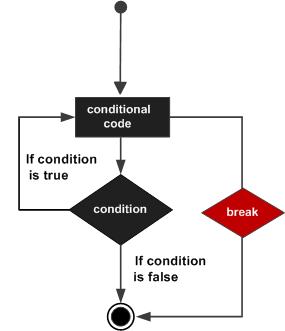Course
break Statement
Java Tutorial
This Java tutorial is tailored for newcomers, offering a journey from basic principles to complex Java programming techniques. Completing this tutorial equips you with a solid understanding of Java, preparing you for advanced learning. You'll emerge ready to tackle the challenges of becoming a top-tier software engineer, with the skills to innovate and excel in the vast world of software development.
Break Statement
Java break Statement
The break statement in Java programming language has following two usages
- When the break statement is encountered inside a loop, the loop is immediately terminated and the program control resumes at the next statement following the loop.
Syntax
The syntax of a break is a single statement inside any loop or switch case −
break;Flow Diagram

Examples
Example 1: Using break with while loop
In this example, we're showing the use of a break statement to break a while loop to print numbers starting from 10 to 14 which will otherwise print element till 19. Here we've initialized an int variable x with a value of 10. Then in while loop, we're checking x as less than 20 and within while loop, we're printing the value of x and incrementing the value of x by 1. While loop will run until x becomes 15. Once x is 15, break statement will break the while loop and program exits.
public class Test {
public static void main(String args[]) { int x = 10;
while( x < 20 ) { if(x == 15){ break; } System.out.print("value of x : " + x ); x++; System.out.print("\n"); } }}Output
value of x : 10value of x : 11value of x : 12value of x : 13value of x : 14Example 2: Using break with for loop
In this example, we're showing the use of a break statement within a for loop to print few elements of an array instead of all elements. Here we're creating an array of integers as numbers and initialized it some values. We've created a variable named index to represent index of the array within for loop, check it against size of the array and incremented it by 1. Within for loop body, we're printing element of the array using index notation. Once 30 is encountered as value, break statement breaks the flow of for loop and program quits.
public class Test {
public static void main(String args[]) { int [] numbers = {10, 20, 30, 40, 50};
for(int index = 0; index < numbers.length; index++) { if(numbers[index] == 30){ break; } System.out.print("value of item : " + numbers[index] ); System.out.print("\n"); } }}Output
value of item : 10value of item : 20Example 3: Using break with an infinite loop
In this example, we're showing the use of break statement to break an infinite loop using while loop. It will keep printing the numbers until the value of x becomes 15.
public class Test {
public static void main(String args[]) { int x = 10;
while( true ) { System.out.print("value of x : " + x ); x++; if(x == 15) { break; } System.out.print("\n"); } }}Output
value of item : 10value of item : 11value of item : 12value of item : 13value of item : 14